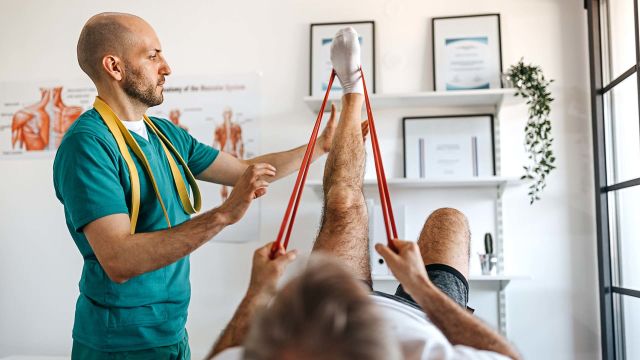Updated on September 11, 2024
Amyotrophic lateral sclerosis (ALS) is a degenerative neurological condition. It’s estimated to affect 30,000 people in the United States, with roughly 5,000 new cases diagnosed every year.
ALS damages cells called motor neurons which are located in the brain and spinal cord. Motor neurons carry signals from the nervous system to the muscles and enable voluntary movements like walking, talking, and chewing.
When motor neurons are damaged, the nervous system cannot send signals to muscles. This affects a person’s ability to perform voluntary movements. It also causes the muscles to atrophy (decrease in size and strength).
Symptoms can include muscle weakness, cramps, tight or stiff muscles, difficulty chewing or swallowing, or slurred speech. Early symptoms can be subtle and the pattern of symptoms differs from person to person.
As the disease progresses, symptoms become more severe and more muscles are affected, including muscles that affect breathing, swallowing, chewing, and breathing.
Who is at risk for ALS?
The exact cause of ALS is unknown, and healthcare researchers do not fully understand why some people develop ALS and others do not. Here are some things we do know about ALS and who is at risk for ALS:
- Most people with ALS are diagnosed between the ages of 40 and 70, but there are also people who are diagnosed in their 20s and 30s.
- Both men and women develop ALS, but it is more common among men.
- In older age groups, it affects men and women in roughly equal number.
- Genetics are a factor in some cases and several genetic mutations linked to ALS have been identified. However, the number of cases associated with these gene mutations is small. Only 5 to 10 percent of people with ALS have a family history of the condition.
- The vast majority of cases (over 90 percent) are sporadic. This means they occur without any genetic cause, or at least no genetic cause that has been identified.
- ALS is more common among non-Hispanic white people.
People who are military veterans are more likely to have ALS than people who are not military veterans, though the reason for this is not understood. Environmental factors (such as exposure to toxins), medical history that includes viral infections and physical trauma, and genetic susceptibility are all being investigated as possible causes.
Treatment for ALS
There is no cure for ALS but there are some medications that can help people with ALS. These include medications that help slow the progression of the disease, as well as medications that address specific symptoms that occur as a result of having ALS. The goals of treatment are to help improve quality of life and lifespan.
Treatment will be overseen by a neurologist but should involve a variety of specialists that oversee different aspects of treatment and care, such as physical therapists, occupational therapists, speech therapists, registered dietitians, and counselors or other mental health professionals who can help people with ALS and their caregivers cope with the emotional and psychological impact of living with the condition.





